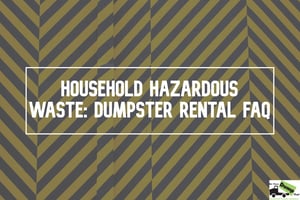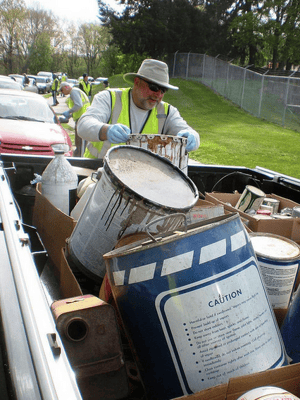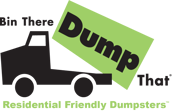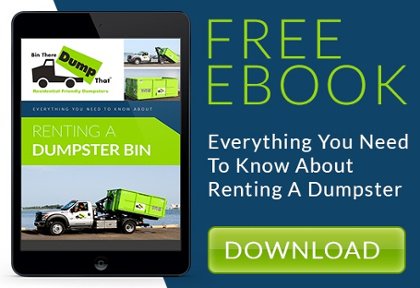“Is there anything that can’t go into the dumpster?” and “What is considered household hazardous waste?” are two frequently asked questions many of our Bin There Dump That customers ask us.
two frequently asked questions many of our Bin There Dump That customers ask us.
For home renovations, spring cleaning and even failed yard sales, residential dumpster rental can be the best way to go when you have a lot of “stuff” to get rid of. And while drywall, scrap wood, that rusted out trampoline and those boxes full of newspapers from the 1980s will feel right at home in a Bin There Dump That bin, it’s important to know that household hazardous waste cannot go into the dumpster.
With that said, let me take this opportunity to explain what waste is considered hazardous — and what options you have to dispose of it.
Household Hazardous Waste Common Examples
Physically, you can fit just about anything into a Bin There Dump That dumpster, but that doesn’t necessarily mean that you should. From corrosive to explosive and flammable to poisonous, here are more than 10 household-related products that cannot go into a residential dumpster rental:
- propane tanks
- ammunition
- leftover paint, paint cans and paint thinner, stains and varnish
- household cleaning products
- batteries
- fluorescent light bulbs
- tires, motor oil, gasoline and antifreeze
- aerosol cans
- pesticides and fertilizers
- pharmaceuticals and bio-medical waste
*Dirt and masonry products are allowed only when arranged at the time of your dumpster rental order.
How To Dispose Of Hazardous Material Safely And Legally
It’s not uncommon to think that dumpster you rent can take anything you throw at it. And it can be frustrating to  a homeowner when he or she learns there are some usage limitations. But that doesn’t mean Plan B should involve dumping your hazardous waste down the nearest sink, toilet or sewer. It also doesn’t mean putting it out on the curb for trash day or burning it up in a backyard bonfire. Those are three big no-no’s.
a homeowner when he or she learns there are some usage limitations. But that doesn’t mean Plan B should involve dumping your hazardous waste down the nearest sink, toilet or sewer. It also doesn’t mean putting it out on the curb for trash day or burning it up in a backyard bonfire. Those are three big no-no’s.
There are better, safer ways to go about disposing any of those items listed above. Here are four hazardous waste disposal services available in most municipalities.
Permanent Waste Collection Facility – Some communities have waste collection facilities that enable residents to drop off unused or partially used household chemicals. These locations may also offer an exchange program that allows other residents to recycle and reuse items you’ve dropped off.
Designated Community Collection Days – If a year round facility isn’t available, community collection days probably are. Days can have special designations, so make sure you know what’s being collected on a given day.
Local Business Collection Sites – A few times a year, some area businesses will turn their location into a waste collection site. For example, auto mechanic garages may collect motor oil or a local hardware store will take in used propane tanks.
Curbside Waste Pick-up – Depending on the waste, transporting it to a collection site might not be ideal – or legal. Check with city hall for transporting waste in your community. Check in with any local environmental agencies to see if they offer curbside hazardous waste pick-up.
Clean Up The Right Way With Bin There Dump That
The next time you’re a little leary on what to dump and what not to dump, connect with your local Bin There Dump That franchise operator! Our highly trained team can answer all your hazardous household waste disposal questions, including questions about recycling trash from your home, and help you find the most eco-friendly waste disposal option for you.
Images: Couple, City worker

